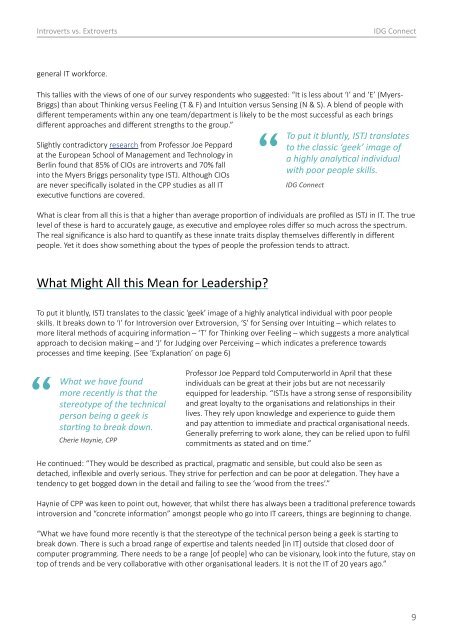The Gift of Introversion
The Gift of Introversion
The Gift of Introversion
You also want an ePaper? Increase the reach of your titles
YUMPU automatically turns print PDFs into web optimized ePapers that Google loves.
Introverts vs. Extroverts<br />
IDG Connect<br />
general IT workforce.<br />
This tallies with the views <strong>of</strong> one <strong>of</strong> our survey respondents who suggested: “It is less about ‘I’ and ‘E’ (Myers-<br />
Briggs) than about Thinking versus Feeling (T & F) and Intuition versus Sensing (N & S). A blend <strong>of</strong> people with<br />
different temperaments within any one team/department is likely to be the most successful as each brings<br />
different approaches and different strengths to the group.”<br />
Slightly contradictory research from Pr<strong>of</strong>essor Joe Peppard<br />
at the European School <strong>of</strong> Management and Technology in<br />
Berlin found that 85% <strong>of</strong> CIOs are introverts and 70% fall<br />
into the Myers Briggs personality type ISTJ. Although CIOs<br />
are never specifically isolated in the CPP studies as all IT<br />
executive functions are covered.<br />
To put it bluntly, ISTJ translates<br />
to the classic ‘geek’ image <strong>of</strong><br />
a highly analytical individual<br />
“with poor people skills.<br />
IDG Connect<br />
What is clear from all this is that a higher than average proportion <strong>of</strong> individuals are pr<strong>of</strong>iled as ISTJ in IT. <strong>The</strong> true<br />
level <strong>of</strong> these is hard to accurately gauge, as executive and employee roles differ so much across the spectrum.<br />
<strong>The</strong> real significance is also hard to quantify as these innate traits display themselves differently in different<br />
people. Yet it does show something about the types <strong>of</strong> people the pr<strong>of</strong>ession tends to attract.<br />
What Might All this Mean for Leadership?<br />
To put it bluntly, ISTJ translates to the classic ‘geek’ image <strong>of</strong> a highly analytical individual with poor people<br />
skills. It breaks down to ‘I’ for <strong>Introversion</strong> over Extroversion, ‘S’ for Sensing over Intuiting – which relates to<br />
more literal methods <strong>of</strong> acquiring information – ‘T’ for Thinking over Feeling – which suggests a more analytical<br />
approach to decision making – and ‘J’ for Judging over Perceiving – which indicates a preference towards<br />
processes and time keeping. (See ‘Explanation’ on page 6)<br />
“<br />
What we have found<br />
more recently is that the<br />
stereotype <strong>of</strong> the technical<br />
person being a geek is<br />
starting to break down.<br />
Cherie Haynie, CPP<br />
Pr<strong>of</strong>essor Joe Peppard told Computerworld in April that these<br />
individuals can be great at their jobs but are not necessarily<br />
equipped for leadership. “ISTJs have a strong sense <strong>of</strong> responsibility<br />
and great loyalty to the organisations and relationships in their<br />
lives. <strong>The</strong>y rely upon knowledge and experience to guide them<br />
and pay attention to immediate and practical organisational needs.<br />
Generally preferring to work alone, they can be relied upon to fulfil<br />
commitments as stated and on time.”<br />
He continued: “<strong>The</strong>y would be described as practical, pragmatic and sensible, but could also be seen as<br />
detached, inflexible and overly serious. <strong>The</strong>y strive for perfection and can be poor at delegation. <strong>The</strong>y have a<br />
tendency to get bogged down in the detail and failing to see the ‘wood from the trees’.”<br />
Haynie <strong>of</strong> CPP was keen to point out, however, that whilst there has always been a traditional preference towards<br />
introversion and “concrete information” amongst people who go into IT careers, things are beginning to change.<br />
“What we have found more recently is that the stereotype <strong>of</strong> the technical person being a geek is starting to<br />
break down. <strong>The</strong>re is such a broad range <strong>of</strong> expertise and talents needed [in IT] outside that closed door <strong>of</strong><br />
computer programming. <strong>The</strong>re needs to be a range [<strong>of</strong> people] who can be visionary, look into the future, stay on<br />
top <strong>of</strong> trends and be very collaborative with other organisational leaders. It is not the IT <strong>of</strong> 20 years ago.”<br />
9

















